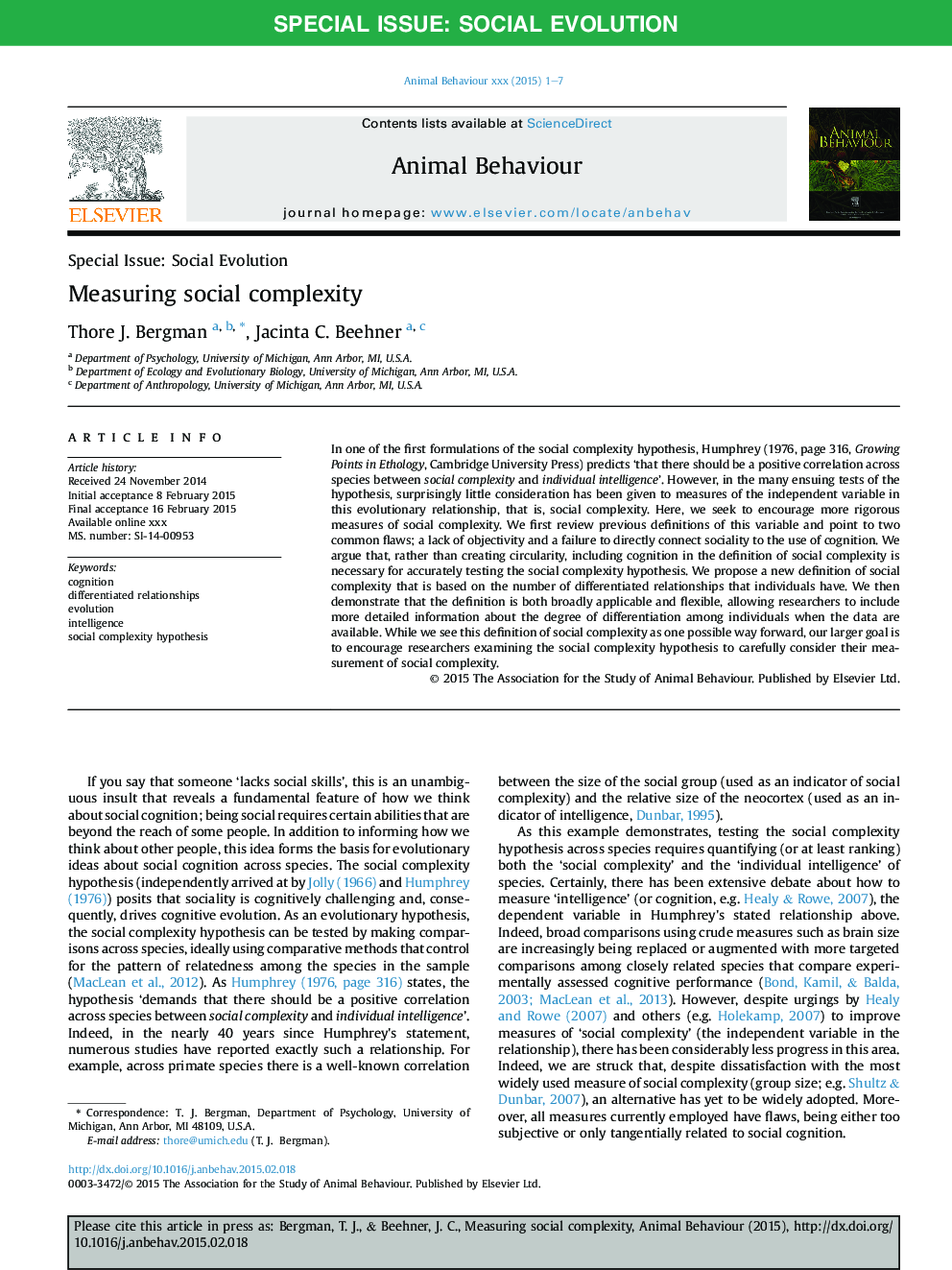| کد مقاله | کد نشریه | سال انتشار | مقاله انگلیسی | نسخه تمام متن |
|---|---|---|---|---|
| 8489969 | 1552225 | 2015 | 7 صفحه PDF | دانلود رایگان |
عنوان انگلیسی مقاله ISI
Measuring social complexity
ترجمه فارسی عنوان
اندازه گیری پیچیدگی اجتماعی
دانلود مقاله + سفارش ترجمه
دانلود مقاله ISI انگلیسی
رایگان برای ایرانیان
کلمات کلیدی
شناخت، روابط متمایز سیر تکاملی، هوش فرضیه پیچیدگی اجتماعی،
ترجمه چکیده
هامفری (1976، ص 316، نقاط رشد در اکتوپولوژی، انتشارات دانشگاه کمبریج) در یکی از اولین فرمولاسیون های فرضیه پیچیدگی اجتماعی پیش بینی می کند که بین گونه ای بین پیچیدگی اجتماعی و هوش فردی رابطه مثبت وجود دارد. با این حال، در بسیاری از تست های این فرضیه، به اندازه گیری های متغیر مستقل در این رابطه تکاملی، یعنی پیچیدگی اجتماعی، به طور شگفت آور کمی توجه شده است. در اینجا، ما تلاش می کنیم اقدامات سخت تر اجتماعی پیچیده تر را تشویق کنیم. ابتدا تعاریف قبلی این متغیر را بررسی می کنیم و به دو معایب رایج اشاره می کنیم؛ فقدان عینیت و عدم ارتباط مستقیم اجتماعی با استفاده از شناخت. ما استدلال می کنیم که به جای ایجاد دایره المعارف، از جمله شناخت در تعریف پیچیدگی اجتماعی برای تست دقیق فرضیه پیچیدگی اجتماعی ضروری است. ما تعریف جدیدی از پیچیدگی اجتماعی پیشنهاد می کنیم که بر اساس تعدادی از روابط متمایز که افراد دارند، استوار است. سپس ما نشان می دهیم که تعریف هر دو به طور گسترده ای قابل اجرا و انعطاف پذیر است، به محض اینکه داده ها در دسترس باشد، محققان می توانند اطلاعات دقیق تر درباره میزان تمایز بین افراد را نشان دهند. در حالی که ما این تعریف پیچیدگی اجتماعی را به عنوان یک راه ممکن برای پیش رو می بینیم، هدف بزرگ ما این است که محققان بررسی فرضیه پیچیدگی اجتماعی را به دقت در نظر سنجی خود از پیچیدگی اجتماعی را تشویق کنند.
موضوعات مرتبط
علوم زیستی و بیوفناوری
علوم کشاورزی و بیولوژیک
علوم دامی و جانورشناسی
چکیده انگلیسی
In one of the first formulations of the social complexity hypothesis, Humphrey (1976, page 316, Growing Points in Ethology, Cambridge University Press) predicts 'that there should be a positive correlation across species between social complexity and individual intelligence'. However, in the many ensuing tests of the hypothesis, surprisingly little consideration has been given to measures of the independent variable in this evolutionary relationship, that is, social complexity. Here, we seek to encourage more rigorous measures of social complexity. We first review previous definitions of this variable and point to two common flaws; a lack of objectivity and a failure to directly connect sociality to the use of cognition. We argue that, rather than creating circularity, including cognition in the definition of social complexity is necessary for accurately testing the social complexity hypothesis. We propose a new definition of social complexity that is based on the number of differentiated relationships that individuals have. We then demonstrate that the definition is both broadly applicable and flexible, allowing researchers to include more detailed information about the degree of differentiation among individuals when the data are available. While we see this definition of social complexity as one possible way forward, our larger goal is to encourage researchers examining the social complexity hypothesis to carefully consider their measurement of social complexity.
ناشر
Database: Elsevier - ScienceDirect (ساینس دایرکت)
Journal: Animal Behaviour - Volume 103, May 2015, Pages 203-209
Journal: Animal Behaviour - Volume 103, May 2015, Pages 203-209
نویسندگان
Thore J. Bergman, Jacinta C. Beehner,
